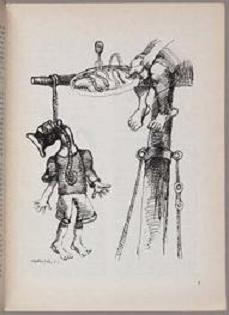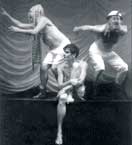Zdarzenia na brygu Banbury
“Staring at one’s feet was a punishment for inadequate cleanliness—whoever had dirty feet had to stare at them for almost an hour.”

Written in 1932, the fantasy story The Events on the Banbury was first published in 1933 in the collection Memoirs from a Time of Immaturity. Like the other stories, it was later taken up again by Witold Gombrowicz for the expanded, 1957 volume Bacacay (Wydawnictwo Literackie, Krakow). At this time, Witold Gombrowicz removed the story’s original subtitle: The Aura of the Spirit of F. Zantman.

In the preface to the 1933 edition of the collection, ultimately pulled before publication, Witold Gombrowicz wrote:
|
“The ‘Events on the Banbury’ constitute, as the subtitle states, an attempt to bring the ‘aura from the mind’; the principle of this story is contained in its last word: ‘The exterior is a mirror in which the inside can be observed!’ The exterior reality refracts itself differently in each one of us; the more the psychic faculties are thrown out of order, the greater the deformation. This is the dramatic story of a mind described through exterior events. It is the incessant work of a brain weaving a net that ultimately strangles it. Zantman has gone mad, overwhelmed by the arbitrary, the maniacal monotony and the fundamental indecency of grotesque and absurd phenomena counteracting the best-kept secrets of the soul.”“The ‘Events on the Banbury’ constitute, as the subtitle states, an attempt to bring the ‘aura from the mind’; the principle of this story is contained in its last word: ‘The exterior is a mirror in which the inside can be observed!’ The exterior reality refracts itself differently in each one of us; the more the psychic faculties are thrown out of order, the greater the deformation. This is the dramatic story of a mind described through exterior events. It is the incessant work of a brain weaving a net that ultimately strangles it. Zantman has gone mad, overwhelmed by the arbitrary, the maniacal monotony and the fundamental indecency of grotesque and absurd phenomena counteracting the best-kept secrets of the soul.”
“A Summary Explanation,” Varia [Trans. Dubowski]
|

The name “Banbury” is a possible allusion to Oscar Wilde’s famous comedy The Importance of Being Earnest, whose first Polish production took place in 1919 at Teatr Mały, Warsaw. “Banbury” is a character imagined by one of the story’s principal characters—a self-purported (and chore-avoiding) “invalid” living in the countryside.

In her preface to a new edition of the story (Wyd. Morskie, Gdańsk, 1982), titled Existential Drama on the Sea (Drama egzystencji na morzu), professor Maria Janion qualifies The Events on the Banbury as “one of the most profoundly and irrevocably pessimist works of all Polish literature.” She compares Witold Gombrowicz’s philosophy here to Edgar Allen Poe’s ingenious story The Narrative of Arthur Gordon Pym of Nantucket, a classic of fantasy literature. The boat represents “this place in which ennui distills itself in an exceptional manner,” and thus becomes “an isolation which permits observation, with an acuity that is impossible elsewhere, of the tragic incidences of Man and Form.” [Trans. Dubowski]
Excerpt: Around midnight the sea wind turned into a storm. The brig pitched like a child’s swing, creaking as it hurtled forward; and in a short time the momentum had increased so much that I could not tear myself away from the back wall of the cabin. The Banbury held out valiantly, meeting the wind with a sharp starboard tack. Excerpt: Around midnight the sea wind turned into a storm. The brig pitched like a child’s swing, creaking as it hurtled forward; and in a short time the momentum had increased so much that I could not tear myself away from the back wall of the cabin. The Banbury held out valiantly, meeting the wind with a sharp starboard tack. After twenty-six hours the pitching ceased, but I preferred not to go out on a deck. For there most certainly had been a mutiny, and if not a mutiny then in any case something like it—so I thought I was better advised to stay on my own till I knew for certain what I would find outside. I locked my door and blocked it with a cupboard; in the corner I had a packet of sponge biscuits and eleven bottles of beer.





